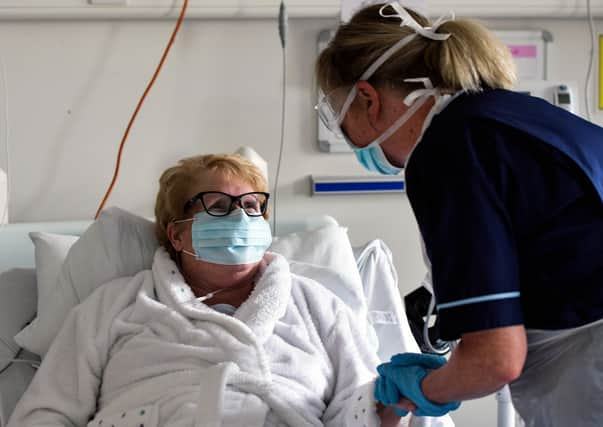Study finds coronavirus causing long-term damage


Researchers in the Tyrolean region of Austria recruited coronavirus patients who had been admitted to hospital, and at the European Respiratory Society International Congress today they report on the first 86 patients enrolled between 29 April and 9 June.
The patients were scheduled to return for evaluation six, 12 and 24 weeks after being discharged, in what is said to be the first prospective follow-up of people infected with coronavirus.
Advertisement
Hide AdAdvertisement
Hide AdClinical examinations, laboratory tests, analysis of the amounts of oxygen and carbon dioxide in arterial blood, and lung function tests were carried out during these visits.
At the time of their first visit, more than half of the patients had at least one persistent symptom, predominantly breathlessness and coughing, and CT scans still showed lung damage in 88 per cent of patients.
But by the time of their next visit, 12 weeks after discharge, the symptoms had improved, and lung damage was reduced to 56 per cent.
A total of 56 patients (65 per cent) showed persistent symptoms at the time of their six-week visit. By the 12-week visit, breathlessness had improved and was present in 31 patients, but 13 patients were still coughing.
At this stage, it is too early to have results from the evaluations at 24 weeks.
Dr Sabina Sahanic, a clinical PhD student at the University Clinic in Innsbruck and part of the team that carried out the study, said: “The bad news is that people show lung impairment from Covid-19 weeks after discharge; the good news is that the impairment tends to ameliorate over time, which suggests the lungs have a mechanism for repairing themselves.”
At the six-week visit, echocardiograms showed that 48 patients had dysfunction of the left ventricle of the heart at the point when it is relaxing and dilating.
Biological indicators of heart damage, blood clots and inflammation were all significantly elevated.
Advertisement
Hide AdAdvertisement
Hide AdDr Sahanic added: “Fortunately, in the Innsbruck cohort, we did not observe any severe coronavirus-associated heart dysfunction in the post-acute phase.”
A separate presentation to the congress said that the sooner Covid-19 patients started a pulmonary rehabilitation programme after coming off ventilators, the better and faster their recovery.
Yara Al Chikhanie, a PhD student at the Dieulefit Sante clinic for pulmonary rehabilitation and the Hp2 Lab at the Grenoble Alps University in France, used a walking test to evaluate the weekly progress of 19 patients who had spent an average of three weeks in intensive care and two weeks in a pulmonary ward before being transferred to a clinic for pulmonary rehabilitation.
She said: “The most important finding was that patients who were admitted to pulmonary rehabilitation shortly after leaving intensive care progressed faster than those who remained inactive.”
Comments
Want to join the conversation? Please or to comment on this article.